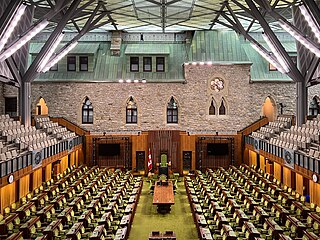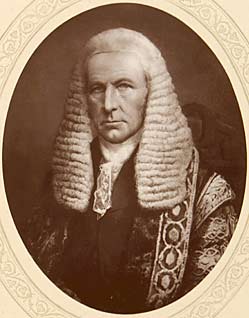
The House of Lords, also known as the House of Peers, is the upper house of the Parliament of the United Kingdom. Membership is by appointment, heredity or official function. Like the House of Commons, it meets in the Palace of Westminster in London, England.

The House of Commons is the lower house of the Parliament of the United Kingdom. Like the upper house, the House of Lords, it meets in the Palace of Westminster in London, England. The House of Commons is an elected body consisting of 650 members known as members of Parliament (MPs). MPs are elected to represent constituencies by the first-past-the-post system and hold their seats until Parliament is dissolved.

The Parliament of the United Kingdom is the supreme legislative body of the United Kingdom, the Crown Dependencies and the British Overseas Territories. It meets at the Palace of Westminster, London. It alone possesses legislative supremacy and thereby ultimate power over all other political bodies in the UK and the overseas territories. Parliament is bicameral but has three parts, consisting of the sovereign (King-in-Parliament), the House of Lords, and the House of Commons. In theory, power is officially vested in the King-in-Parliament. However, the Crown normally acts on the advice of the prime minister, and the powers of the House of Lords are limited to only delaying legislation; thus power is de facto vested in the House of Commons.

Cloture, closure or, informally, a guillotine, is a motion or process in parliamentary procedure aimed at bringing debate to a quick end. The cloture procedure originated in the French National Assembly, from which the name is taken. Clôture is French for "the act of terminating something". It was introduced into the Parliament of the United Kingdom by William Ewart Gladstone to overcome the obstructionism of the Irish Parliamentary Party and was made permanent in 1887. It was subsequently adopted by the United States Senate and other legislatures. The name cloture remains in the United States; in Commonwealth countries it is usually closure or, informally, guillotine; in the United Kingdom closure and guillotine are distinct motions.

The House of Commons of Canada is the lower house of the Parliament of Canada. Together with the Crown and the Senate of Canada, they comprise the bicameral legislature of Canada.
Acts of Parliament, sometimes referred to as primary legislation, are texts of law passed by the legislative body of a jurisdiction. In most countries with a parliamentary system of government, acts of parliament begin as a bill, which the legislature votes on. Depending on the structure of government, this text may then be subject to assent or approval from the executive branch.

The speaker of the House of Commons is the presiding officer of the House of Commons, the lower house and primary chamber of the Parliament of the United Kingdom. The current speaker, Sir Lindsay Hoyle, was elected Speaker on 4 November 2019, following the retirement of John Bercow. Hoyle began his first full parliamentary term in the role on 17 December 2019, having been unanimously re-elected after the 2019 general election.

The speaker of the House of Commons is the presiding officer of the lower house of the Parliament of Canada. A member of Parliament (MP), they are elected at the beginning of each new parliament by fellow MPs. The speaker's role in presiding over Canada's House of Commons is similar to that of speakers elsewhere in other countries that use the Westminster system.

In New Zealand, the speaker of the House of Representatives, commonly known as the speaker of the House, is the presiding officer and highest authority of the New Zealand House of Representatives. The individual who holds the position is elected by members of the House from among their number in the first session after each general election. They hold one of the highest-ranking offices in New Zealand. The current Speaker is Adrian Rurawhe who was elected on 24 August 2022.
A casting vote is a vote that someone may exercise to resolve a tied vote in a deliberative body. A casting vote is typically by the presiding officer of a council, legislative body, committee, etc., and may only be exercised to break a deadlock.

The lord speaker of the House of Lords is the presiding officer, chairman and highest authority of the House of Lords in the Parliament of the United Kingdom. The office is analogous to the Speaker of the House of Commons: the Lord Speaker is elected by the members of the House of Lords and is expected to be politically impartial.

Speaker Denison's rule is a constitutional convention established by John Evelyn Denison, who was Speaker of the British House of Commons from 1857 to 1872, regarding how the Speaker decides on their casting vote in the event of a tie in the number of votes cast in a division.

A ways and means committee is a government body that is charged with reviewing and making recommendations for government budgets. Because the raising of revenue is vital to carrying out governmental operations, such a committee is tasked with finding the ways and means with which to raise that revenue.

In the United Kingdom, the Chairman of Ways and Means is a senior member of the House of Commons who acts as one of the Speaker's three deputies. The incumbent is Dame Eleanor Laing, MP for Epping Forest, who was first elected to the office on 8 January 2020.
A committee of the whole is a meeting of a legislative or deliberative assembly using procedural rules that are based on those of a committee, except that in this case the committee includes all members of the assembly. As with other (standing) committees, the activities of a committee of the whole are limited to considering and making recommendations on matters that the assembly has referred to it; it cannot take up other matters or vote directly on the assembly's business. The purpose of a committee of the whole is to relax the usual limits on debate, allowing a more open exchange of views without the urgency of a final vote. Debates in a committee of the whole may be recorded but are often excluded from the assembly's minutes. After debating, the committee submits its conclusions to the assembly and business continues according to the normal rules.

In the United Kingdom an act of Parliament is primary legislation passed by the Parliament of the United Kingdom.

The Sarawak State Legislative Assembly is the legislative chamber of the unicameral legislature of the Malaysian state of Sarawak; the Yang di-Pertua Negeri of Sarawak forms the other part of the legislature. The Assembly is modelled after the traditions of the Westminster parliamentary system, which originates from the practices of the British Parliament. The executive branch of government is drawn from the elected members of the Assembly. The State Legislative Assembly sits at the Sarawak State Legislative Assembly Building located in Petra Jaya in Kuching, the state capital.
The Panel of Chairs are members of the House of Commons of the United Kingdom responsible for chairing public bill committees and other General Committees, as well as debates in Westminster Hall, the parallel debating chamber. The three Deputy Speakers, who are automatically members, are responsible for chairing Committees of the Whole House. Other members may act as temporary chairs of Committees of the Whole House. The Panel is not itself generally thought of as a committee, but it does have the power to meet to consider matters relating to procedure in the general committees and report its findings to the House of Commons.

The European Union (Withdrawal) Act 2019, commonly referred to as the Cooper–Letwin Act, was an Act of the Parliament of the United Kingdom that made provisions for extensions to the period defined under Article 50 of the Treaty on European Union related to the United Kingdom's withdrawal from the European Union. It was introduced to the House of Commons by Labour MP Yvette Cooper and Conservative MP Sir Oliver Letwin on 3 April 2019, in an unusual process where the Government of the United Kingdom did not have control over Commons business that day.












